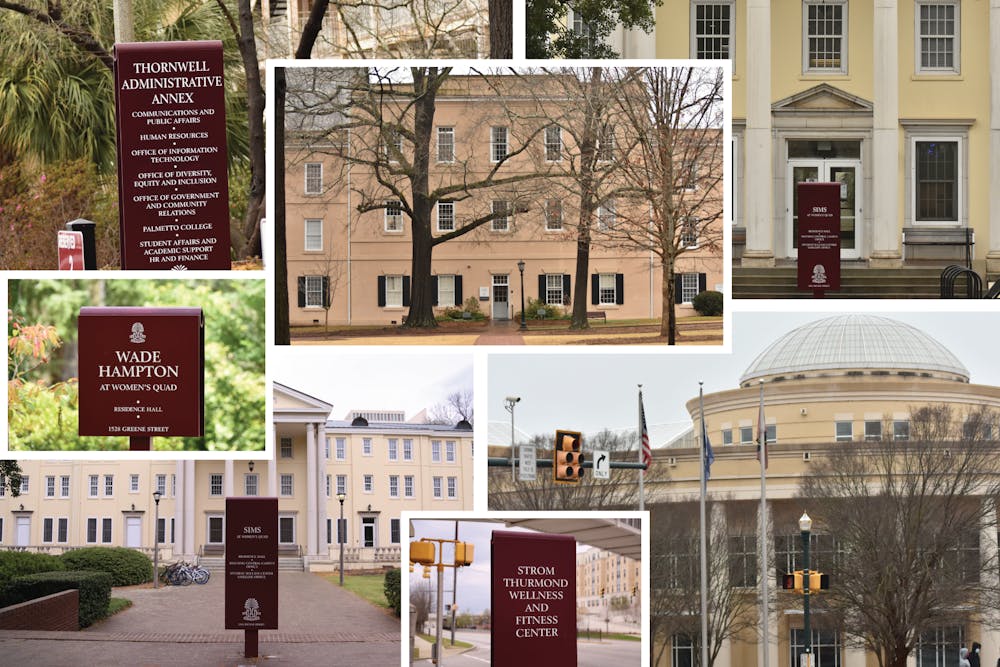University President Bob Caslen created the Presidential Commission on University History in October 2019 to research and report on USC’s past and provide suggestions to him about renaming campus buildings and publicizing university history.
University President Emeritus Harris Pastides suggested the commission to Caslen — which several other universities also have versions of — towards the end of his own presidency, Pastides said. Pastides' diversity and inclusion advisory committee recommended the idea to him.
“I thought it was a wonderful idea, but I knew that the work of the commission would certainly span well into the term of my successor,” Pastides said. “Although I was happy to endorse the idea, I knew it should really be authorized and started by the next leader.”
The commission is made up of 29 members that are split into three subcommittees: Communications and Education, Names on the Landscape and University History. Each group is chaired by two individuals and there are three co-chairs over the entire commission.
Pastides, associate professor of history Valinda Littlefield and university archivist Elizabeth West are the co-chairs. They are in charge of scheduling meetings and setting the meeting agendas.
The entire commission meets together at least once a month, and each meeting is open to the public. The subcommittees meet more frequently.
The Communication and Education committee is responsible for creating a website with historical information about the Horseshoe, buildings and green spaces. The committee is also working on updating it to include information about underrepresented groups, according to West.
“The idea is that the website, since it branches off of the main university page, that will be a one stop place where people can come and really explore the university's history in different subjects,” West said.
The Names on the Landscape subcommittee has identified 16 buildings to research and determine if the name should be changed or not.
In its final report to Caslen, the commission must include why each building is being examined, a summary of the individual who the building was named after, a reason for why the name should remain the same, a reason for why the name should change and the committee’s final recommendation.
“The Names on the Landscape committee is doing the research,” Pastides said. “They will recommend to the full commission what they propose that the commission recommend to President Caslen, and the full commission, every member of the commission, will vote on every name, or plaque, or room or whatever it might be.”
The University History committee is determining a list of names to use for future buildings and landscapes. It is also working on ways to uplift underrepresented voices and advising Caslen on how to change University 101 programs to include information about Black experiences on campus.
“Most of our interactions with history are through plaques, building names, memorials,” Christian Anderson, associate professor in the College of Education said. “And so I think that's part of what we are working on too is: how do we express the university's history in a way that is meaningful and representative to everyone involved?”
The final report to Caslen will be complete at the beginning of July, according to West. It is Caslen's decision to move forward with the suggestions the commission makes. He can also decide to not move forward with the committee's suggestions.
“We're advisory. And so this is going to be our advice, our suggestions for how the university can really embrace and dig down and disseminate the information on its complicated history,” West said.
After going through Caslen, the proposed changes will then go to the Board of Trustees and then to the South Carolina Legislature. The Heritage Act of 2000 does not allow buildings named for historic figures on any public area of the state to be renamed.
After the commission completes this project, it is Caslen's decision if he wants to continue the commission or not.
“History is alive, history is who we are, history is what's all around us, and having an understanding of that is important,” Anderson said. “And acknowledging our history, the good and the bad, is important to acknowledging who we are as a people, as a community, as a university.”

